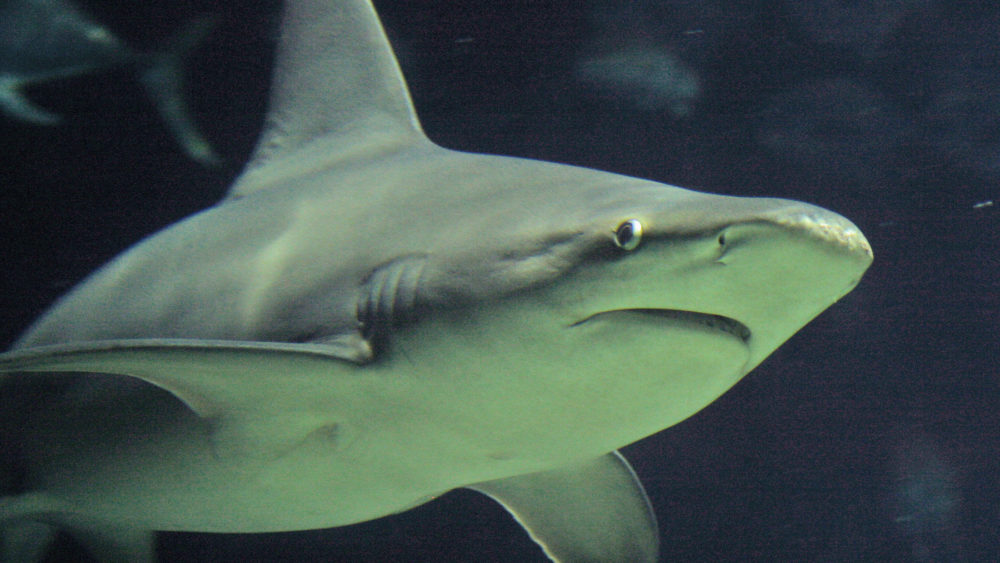In light of June’s Folly Beach shark encounter, we asked our jaw-some Senior Biologist, Arnold Postell, to share his views, advice and knowledge on sharks, one of the world’s most feared and misunderstood creatures.
What are your thoughts on what happened at Folly in June?
Summer is warming up the waters. Sharks are moving around and more people are swimming at the beach. the waves have been great this summer and a lot of surfers were out enjoying the water. When surfers paddle for the waves, there’s a lot of splashing. This can easily be confused with baitfish jumping on the surface, or possibly a wounded fish. Basically, it was a case of mistaken identity. Luckily the surfer wasn’t hurt during the incident, just his surfboard.
What kind of shark do you think it was, based on the surfer’s account?
Very hard to say. The bite on the surfboard wasn’t very clean so it’s difficult to discern bite radius or shape. The account from the surfer was a 5’-6’ shark. That could fall in either a mid-size or larger shark.
What types of sharks are typically found in our area this time of year?
Smaller: Atlantic Sharpnose, Black nose, Bonnethead
Mid-size: Blacktip, Spinner, Sandbar (aka. Brown), Finetooth
Larger: Bull shark, Lemon shark
Is this a normal occurrence?
It is unusual for a surfer to be bitten off our coast. Traditionally, incidents involving surfers are in areas where great white sharks hunt seals – these incidents are normally a case of mistaken identity.
Did the storm bring bigger sharks to our area?
Animals do behave differently during large weather events. Not only may they move to different areas, but weather can also affect their feeding patterns. This past storm went through very quickly so I’m not sure how much of an effect it had on the animals. I really think this particular case at Folly Beach was just normal feeding behavior with mistaken identity of the “prey”.
Should people fear sharks?
NO! I always hope that people realize the low likelihood of a shark incident. They do happen, but tend to be very low probability and luckily don’t tend to be fatal (especially on the east coast).
First thing to remember is that humans are not on the normal menu for sharks. Sharks actually tend to be very picky eaters. Statistics show that shark attacks are a VERY low probably when compared to many normal daily activities like walking across the street or riding in a vehicle. Definitely not worth skipping the beach and or not swimming in the ocean.
Are sharks important?
YES! Sharks are a good indicator on the health of an ocean eco-system. Apex predators are necessary. If there is a food source to sustain the apex predators then the food-chain tends to be complete.
South Carolina has a very good ocean eco-system managed by SC-DNR and federal regulatory agencies. Their goals of protecting species, restocking, and monitoring populations has worked well and has revived certain species that were once severely depleted like red drum, cobia, red snapper and others.
Programs like the South Carolina Aquarium Good Catch Program, teaches consumers to make good choices toward sustainable options which helps to protect eco-systems.
What should someone do if they encounter a shark while out in the water?
The poor visibility conditions in the waters of South Carolina are what lead to the mistaken identity of swimmers or surfers. If the shark could see us, they would stay away. If we could see them, we would stay away. Surfers sit still for periods of time, splash a bit catching the wave and then they are gone. Swimmers splash, but stay in the same general area making them a bit more vulnerable. I’m not saying that you shouldn’t splash in the ocean, but it is good to be aware of shark behavior as we are visiting THEIR habitat.
If someone is bitten by a shark, there isn’t much that can be done. There have been reports of people punching them in the face, gills, or poking their eyes. That also can lead to lacerations on the hand and arm on top of the original bite wound. Most shark bite incidents are a single bite and then the animal releases and swims off after it realizes the mistake. Then it becomes an issue for the victim to get to shore and deal with first aid. Hopefully there are others in the area to help. Another reason why you shouldn’t swim alone if possible.
What can people do to stay safe in the water?
Historically there have been ideas of avoiding swimming at dusk and dawn or don’t wear shiny jewelry. There may be some benefit to those ideas, but people also get bitten in the middle of the day and not wearing anything shiny.
I tend to look at other environmental factors for some guidance.
-Are bait fish jumping or do you see other animals feeding? Sharks are going to follow the food chain.
-Is anyone fishing around you, especially up-current from you? Sharks can smell the bait or catch and be attracted to the area.
Come visit the South Carolina Aquarium to learn more about sharks during our dive shows and other educational presentations done every day!


